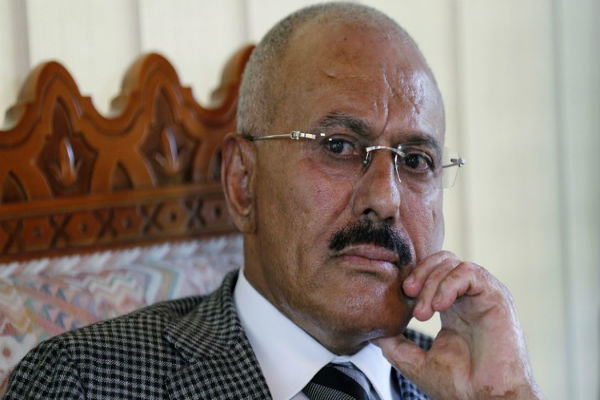A contemplation on fate of Ali Abdullah Saleh

TEHRAN _ It was in March of 2015 that the extensive rampage of Saudi Arabia and its allies against Yemen started. The purpose of this attack was to seize Yemen, retaliate against the Yemeni revolutionaries and manage the developments of Sanaa after the revolution.
Yet, what defeated the Saudis on the battlefield against Yemen was the resistance of the Yemenis. In April 2015, just 41 days after the start of the Yemeni war, Colin Powell, the former U.S. Secretary of State, pointed out a number of important issues.
He stated that they shouldn't have believed the promise of Salman and his son about this war. They told their American allies that the war won't last more than ten days, and that the Saudi army would definitely enter Sana'a within seven days. The result of this 41-day war is now a catastrophe for the invaders. As Powell mentions: We are now hearing the screams of our allies who are calling for help because the Yemenis had surprised everyone, no one thought they could attack Saudi cities and kill their troops and take their weapons. .. "
Then at a time when the whispers of the end of the Saudis' war in Yemen and the transition to a new period in this small country was heard, and the people of this country were brimmed with happiness and victory of their resistance against the Saudi rulers and their allies and their mercenaries, the game of "Ali Abdullah Saleh "started in Riyadh's ground! These days, the name of Ali Abdullah Saleh, former president of Yemen, is heard as a symbol of "failure" and "loss" in Sana'a and Aden and elsewhere in Yemen. Saleh, in the beginning of the battle of the Saudi coalition and their attack on the innocent people of Yemen, united with Ansarullah against Saudi attacks. However, during the time between August and December this year, he decided to bargain on the great achievement of Yemenis in the battle against the Saudi family.
Eventually it has reached a point that in early December, the forces which were under the command of Ali Abdullah Saleh, came to fight against Ansarullah in Sana'a, the capital of Yemen's capital Sana'a. This action by Saleh had the full and direct support of Riyadh behind itself. The bombing of Ansarullah positions in Sanaa by Saudi fighters (in support of the forces attached to Ali Abdullah Saleh) was a clear sign of the alliance between the former Yemeni President and the Saudi family. However it wasn't the end! Ali Abdullah Saleh, in a statement written by Saudi leaders, stressed that if the coalition led by Saudi Arabia stopped its attacks and broke the blockade of northern Yemen, it would be ready to begin new relations. Immediately after the speech, the spokesman for the coalition welcomed his proposal and called for Yemen to return to the Arab family!
Ansarullah's reaction to the betrayal of Ali Abdullah Saleh was quite clever. Yemeni resistance forces insisted that Saleh has turned his back on the Yemeni people. On December 2, Ansarullah announced in an explicit statement:
"Ali Abdullah Saleh's stance shows that the enemies of Yemen are counting on the collapse of Yemen from inside, when their forces couldn't defeat us from outside."
Eventually, Ali Abdullah Saleh, who was about to become the most determining person in Yemen in the current time, was killed in an attack on his home, and with his death his political life was also expired. Yes! Saleh, who, after an alliance with Ansarullah, was able to clean his dark past to some extent from the minds of the Yemeni citizens, once again surrendered to Saudi Arabia's false promises and Riyadh oil dollars. Perhaps if Saleh remained in a position of unity with the Yemeni people and didn't want to bargain over his people's valuable victory with the Saudis and subsequently American leaders, he could play a role in the future of his country as an independent and respectable politician. However, Ali Abdullah Saleh became the victim of his "power-seeking" and "bargaining".
The fate of the former Yemeni president shows that the ideals of a nation can't be traded with the satisfaction of its enemies. Ali Abdullah Saleh not only miscalculated the Yemen's present and future situation, but also ignored the sense of revenge and hatred of the Yemenis towards the murderers of Saudi Arabia.
After his death, the leader of the resistance front said that Saleh had been killed for “treason” and warned the Saudi-led coalition that they would not succeed in Yemen. "Today is the day of the fall of the conspiracy of betrayal and treason. It's a dark day for the forces of the coalition,” he said.
Perhaps Ali Abdullah Saleh was lucky that he received his response to playing in the ground of Riyadh and Washington very soon! Without a doubt, if he continued to follow the path he had taken and became the symbol of betrayal against the Yemeni people's resistance to the Saudis, a far more difficult and painful destiny was awaiting for him. The fate of Ali Abdullah Saleh has now become a lesson for other players and mercenaries of the United States and Saudi Arabia in the region. Saleh's political trade over the ideals of the Yemeni people didn't result in his presence in power, but rather led to his death. A fate that is sooner or later awaiting for people like himin the region.
